Unit 5 Amazing nature Developing ideas1 Listening and speaking 课件+音频(共19张PPT)外研版(2024)七年级下册
文档属性
| 名称 | Unit 5 Amazing nature Developing ideas1 Listening and speaking 课件+音频(共19张PPT)外研版(2024)七年级下册 | 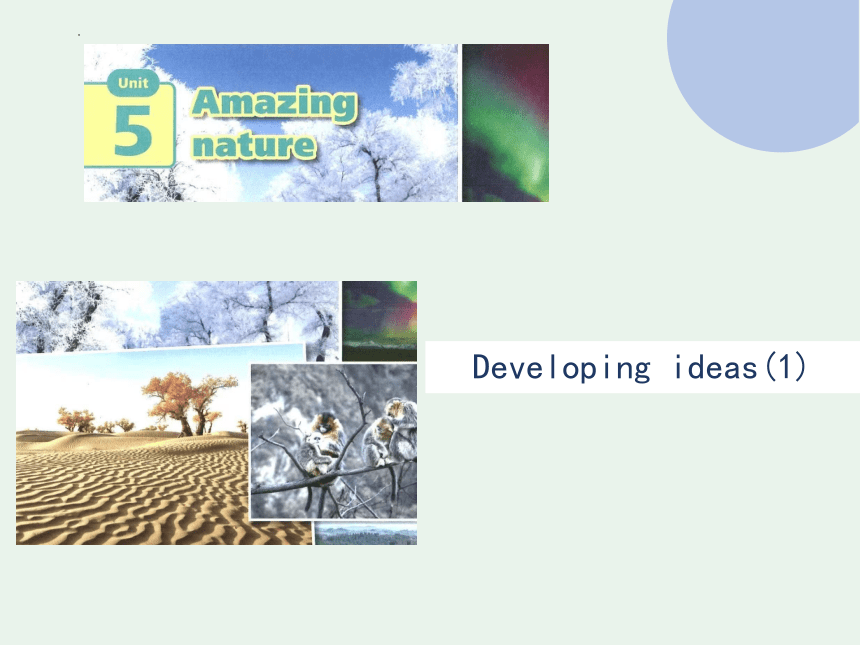 | |
| 格式 | pptx | ||
| 文件大小 | 15.5MB | ||
| 资源类型 | 教案 | ||
| 版本资源 | 外研版 | ||
| 科目 | 英语 | ||
| 更新时间 | 2025-05-01 08:05:41 | ||
图片预览

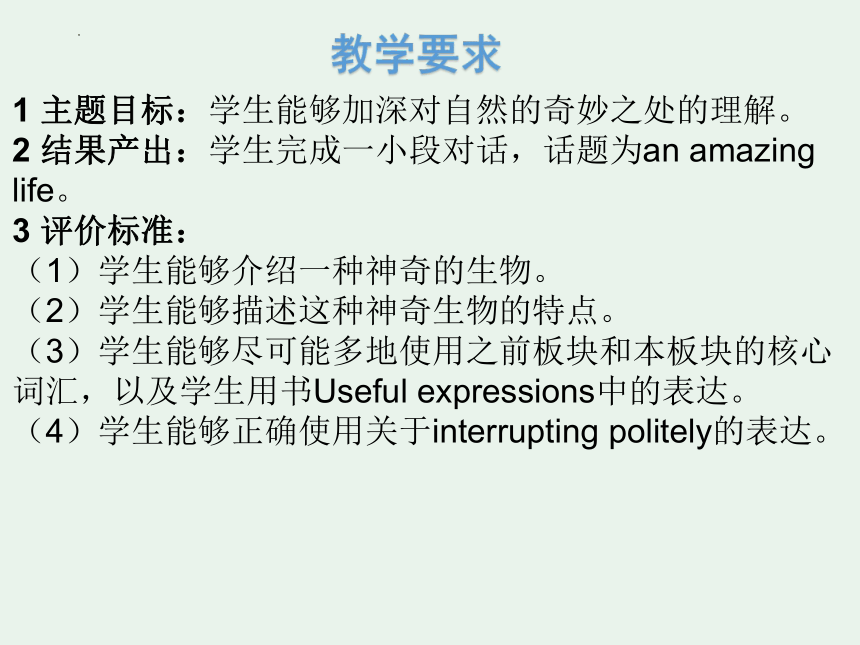
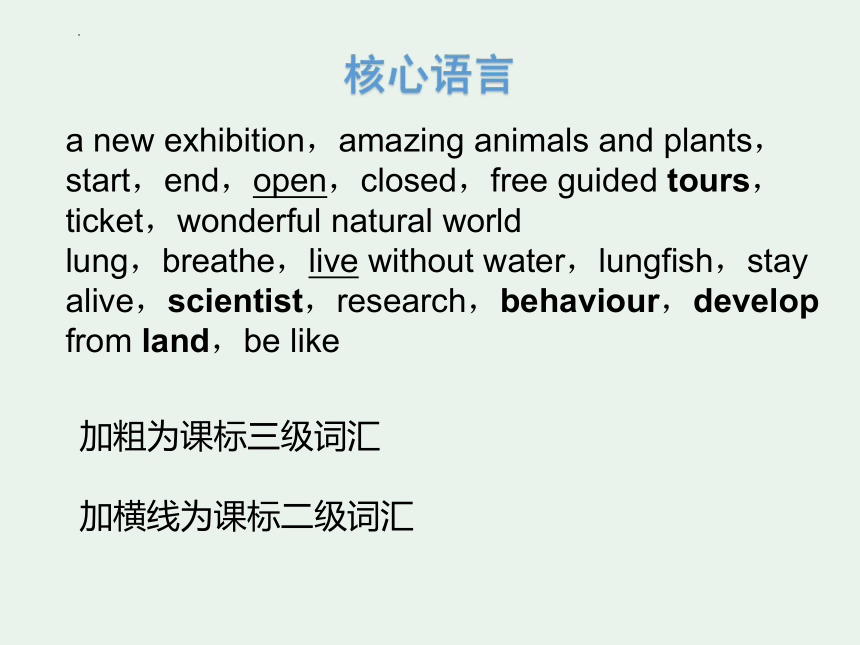
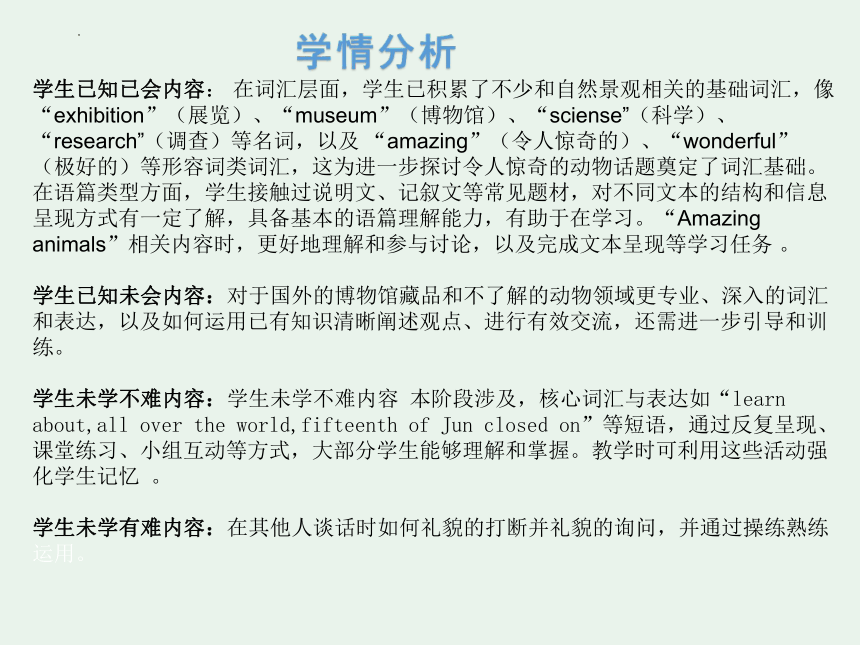
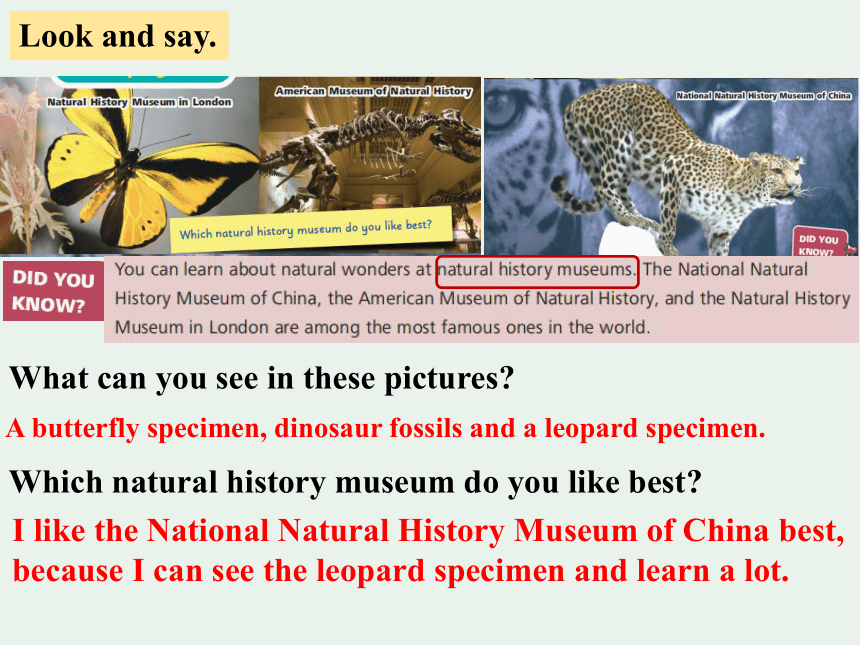
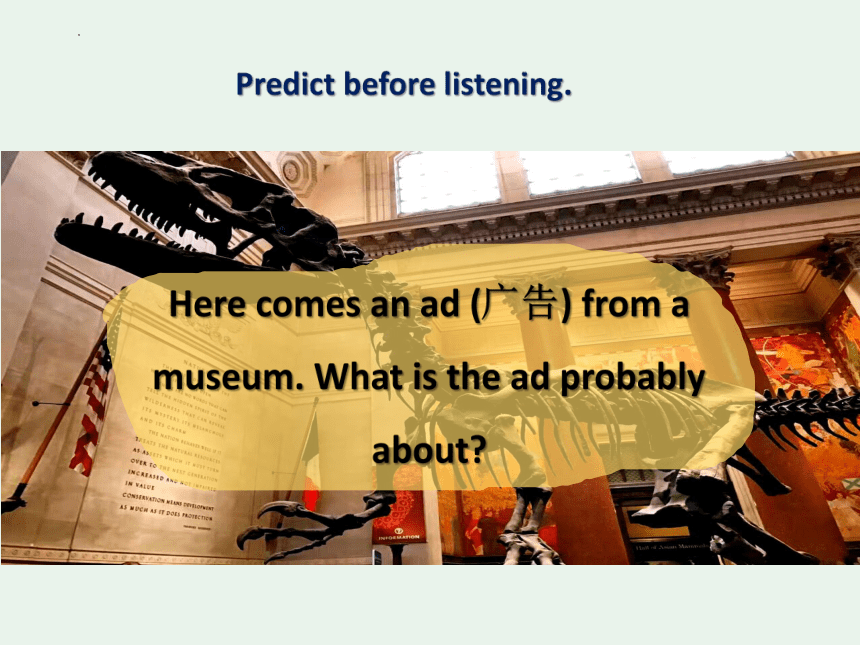
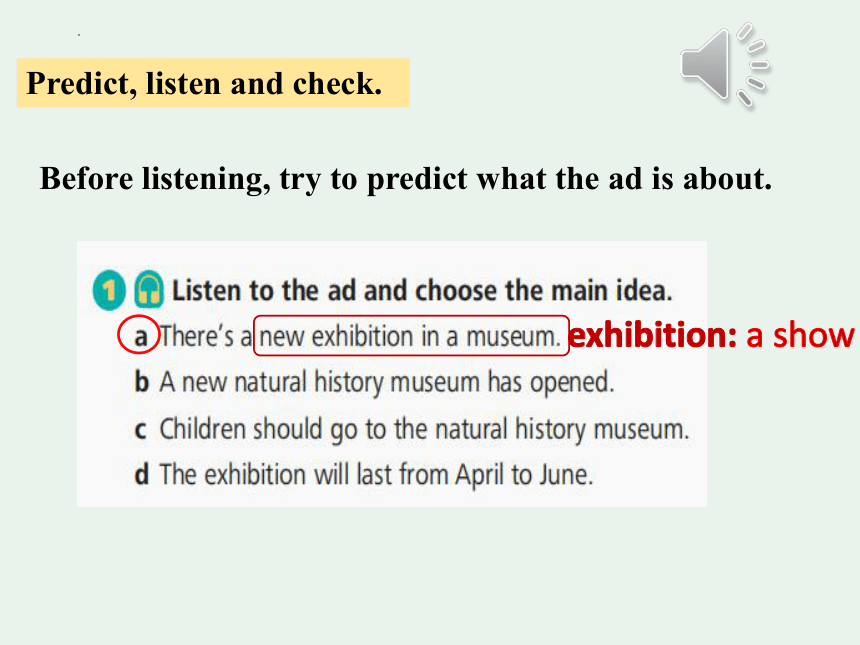
文档简介
(共19张PPT)
Developing ideas(1)
1 主题目标:学生能够加深对自然的奇妙之处的理解。
2 结果产出:学生完成一小段对话,话题为an amazing life。
3 评价标准:
(1)学生能够介绍一种神奇的生物。
(2)学生能够描述这种神奇生物的特点。
(3)学生能够尽可能多地使用之前板块和本板块的核心词汇,以及学生用书Useful expressions中的表达。
(4)学生能够正确使用关于interrupting politely的表达。
教学要求
核心语言
a new exhibition,amazing animals and plants,start,end,open,closed,free guided tours,ticket,wonderful natural world
lung,breathe,live without water,lungfish,stay alive,scientist,research,behaviour,develop from land,be like
加粗为课标三级词汇
加横线为课标二级词汇
学情分析
学生已知已会内容: 在词汇层面,学生已积累了不少和自然景观相关的基础词汇,像“exhibition”(展览)、“museum”(博物馆)、“sciense”(科学)、“research”(调查)等名词,以及 “amazing”(令人惊奇的)、“wonderful”(极好的)等形容词类词汇,这为进一步探讨令人惊奇的动物话题奠定了词汇基础。在语篇类型方面,学生接触过说明文、记叙文等常见题材,对不同文本的结构和信息呈现方式有一定了解,具备基本的语篇理解能力,有助于在学习。“Amazing animals”相关内容时,更好地理解和参与讨论,以及完成文本呈现等学习任务 。
学生已知未会内容:对于国外的博物馆藏品和不了解的动物领域更专业、深入的词汇和表达,以及如何运用已有知识清晰阐述观点、进行有效交流,还需进一步引导和训练。
学生未学不难内容:学生未学不难内容 本阶段涉及,核心词汇与表达如“learn about,all over the world,fifteenth of Jun closed on”等短语,通过反复呈现、课堂练习、小组互动等方式,大部分学生能够理解和掌握。教学时可利用这些活动强化学生记忆 。
学生未学有难内容:在其他人谈话时如何礼貌的打断并礼貌的询问,并通过操练熟练运用。
Look and say.
What can you see in these pictures
Which natural history museum do you like best
A butterfly specimen, dinosaur fossils and a leopard specimen.
I like the National Natural History Museum of China best, because I can see the leopard specimen and learn a lot.
Predict before listening.
Here comes an ad (广告) from a
museum. What is the ad probably
about
Predict, listen and check.
Before listening, try to predict what the ad is about.
exhibition: a show
Content
An ad for a new exhibition
Name
Ticket price
Opening dates
Opening hours
Activity
Amazing life
Amazing animals and plants
From 1 April to 15 June
Five pounds
Free guided tours
Between 9 am and 5 pm
Listen and fill in blanks
Listen again and complete the poster.
A new exhibition is coming to the Museum of Natural Sciences. The name of the exhibition is Amazing Life. Here, you can learn about amazing animals and plants from all over the world. The exhibition will start on the first of April and end on the fifteenth of June. The museum is open between 9 am and 5 pm. It is closed on Mondays. There are free guided tours between 10 am and 11 am. The ticket for the exhibition is five e along and see the wonderful natural world!
Life
animals
9 am
Mondays
10 am
5/five
tour [t ]参观
pounds[pa nd] 英镑
Phonetics in use
Listen and pay attention to the words with red circles.
A new exhibition is coming to the Museum of Natural Sciences. The name of the exhibition is Amazing Life. Here, you can learn about amazing animals and plants from all over the world. The exhibition will start on the first of April and end on the fifteenth of June. The museum is open between 9 am and 5 pm. It is closed on Mondays. There are free guided tours between 10 am and 11 am. The ticket for the exhibition is five e along and see the wonderful natural world!
/s/ science
/z/ museum
/θ/ month
/ / the
Pronunciation:
Listen to the conversation and complete the fact file.
1. What does the fact file (事实档案) include
介绍肺鱼
研究肺鱼
Listen to the conversation and complete the fact file.
2. How does the guide introduce the lungfish
介绍肺鱼
air
sleep
water
Guide: Welcome to Amazing Life. Let’s look at this fish from Africa. It has lungs and can breathe air. It can live without water for months. So its name is “lungfish”. OK. Next, let’s...
Visitor 1: Sorry, but could you explain a little more How do lungfish stay alive
Guide: In the dry season, they go into the wet earth and sleep. And in the rainy season, they go back into the water.
Visitor 1: Thanks.
3. Why do scientists do research on lungfish
Guide: Let’s look at these pictures. Scientists are doing research on lungfish. They study their bodies and behaviour.
Visitor 2: Excuse me. Why do they study lungfish
Guide: Scientists believe that people developed from fish. So this study can help humans understand themselves. Now, let’s...
Visitor 1: Sorry, sir. Did you say people developed from fish
Guide: Yes. Long ago, some fish left the sea. They grew lungs and walked on the land. Lungfish are like those fish.
Listen to the conversation and complete the fact file.
bodies
sea
walked
研究肺鱼
Listen again and answer the questions.
Guide: Welcome to Amazing Life. Let’s look at this fish from Africa. It has lungs and can breathe air. It can live without water for months. So its name is “lungfish”. OK. Next, let’s...
Visitor 1: Sorry, but could you explain a little more How do lungfish stay alive
Guide: In the dry season, they go into the wet earth and sleep. And in the rainy season, they go back into the water.
Visitor 1: Thanks.
Guide: Let’s look at these pictures. Scientists are doing research on lungfish. They study their bodies and behaviour.
Visitor 2: Excuse me. Why do they study lungfish
Guide: Scientists believe that people developed from fish. So this study can help humans understand themselves. Now, let’s...
Visitor 1: Sorry, sir. Did you say people developed from fish
Guide: Yes. Long ago, some fish left the sea. They grew lungs and walked on the land. Lungfish are like those fish.
Visitors: Wow!
1. How do the visitors ask the guide questions
Listen again and answer the questions.
2. What do you think of the visitors
Guide: Welcome to Amazing Life. Let’s look at this fish from Africa. It has lungs and can breathe air. It can live without water for months. So its name is “lungfish”. OK. Next, let’s...
Visitor 1: Sorry, but could you explain a little more How do lungfish stay alive
Guide: In the dry season, they go into the wet earth and sleep. And in the rainy season, they go back into the water.
Visitor 1: Thanks.
Guide: Let’s look at these pictures. Scientists are doing research on lungfish. They study their bodies and behaviour.
Visitor 2: Excuse me. Why do they study lungfish
Guide: Scientists believe that people developed from fish. So this study can help humans understand themselves. Now, let’s...
Visitor 1: Sorry, sir. Did you say people developed from fish
Guide: Yes. Long ago, some fish left the sea. They grew lungs and walked on the land. Lungfish are like those fish.
Visitors: Wow!
I think they are polite and curious.
Learning to learn
Interrupting politely
When someone explains something, you might want to ask a question. You can interrupt politely with Excuse
me or Sorry. Don’t interrupt people in the middle
of a sentence.
sensitive plant
anglerfish
含羞草
琵琶鱼
earthworm
蚯蚓
What do you know about them?
Work in pairs. Ask and answer about another amazing life.
earthworm
蚯蚓
Useful expressions
...is an amazing animal.
Sorry, but could you explain...
May I ask something
Actually, it can...
Excuse me. Why...
Did you know that...
A: The earthworm is amazing. It is very strong.
B: Sorry, but could you explain more about it
A: Sometimes, you cut it into two and it doesn't die. One piece can grow into a new earthworm.
B: Could you explain how that happens
A: Well, the earthworm has special abilities to grow. Its body can repair itself and regrow.
Homework
记忆单词和短语并跟读听力文本。
根据本节课所学内容,整理问题 What have you learnt about amazing life in nature 的答案。
Developing ideas(1)
1 主题目标:学生能够加深对自然的奇妙之处的理解。
2 结果产出:学生完成一小段对话,话题为an amazing life。
3 评价标准:
(1)学生能够介绍一种神奇的生物。
(2)学生能够描述这种神奇生物的特点。
(3)学生能够尽可能多地使用之前板块和本板块的核心词汇,以及学生用书Useful expressions中的表达。
(4)学生能够正确使用关于interrupting politely的表达。
教学要求
核心语言
a new exhibition,amazing animals and plants,start,end,open,closed,free guided tours,ticket,wonderful natural world
lung,breathe,live without water,lungfish,stay alive,scientist,research,behaviour,develop from land,be like
加粗为课标三级词汇
加横线为课标二级词汇
学情分析
学生已知已会内容: 在词汇层面,学生已积累了不少和自然景观相关的基础词汇,像“exhibition”(展览)、“museum”(博物馆)、“sciense”(科学)、“research”(调查)等名词,以及 “amazing”(令人惊奇的)、“wonderful”(极好的)等形容词类词汇,这为进一步探讨令人惊奇的动物话题奠定了词汇基础。在语篇类型方面,学生接触过说明文、记叙文等常见题材,对不同文本的结构和信息呈现方式有一定了解,具备基本的语篇理解能力,有助于在学习。“Amazing animals”相关内容时,更好地理解和参与讨论,以及完成文本呈现等学习任务 。
学生已知未会内容:对于国外的博物馆藏品和不了解的动物领域更专业、深入的词汇和表达,以及如何运用已有知识清晰阐述观点、进行有效交流,还需进一步引导和训练。
学生未学不难内容:学生未学不难内容 本阶段涉及,核心词汇与表达如“learn about,all over the world,fifteenth of Jun closed on”等短语,通过反复呈现、课堂练习、小组互动等方式,大部分学生能够理解和掌握。教学时可利用这些活动强化学生记忆 。
学生未学有难内容:在其他人谈话时如何礼貌的打断并礼貌的询问,并通过操练熟练运用。
Look and say.
What can you see in these pictures
Which natural history museum do you like best
A butterfly specimen, dinosaur fossils and a leopard specimen.
I like the National Natural History Museum of China best, because I can see the leopard specimen and learn a lot.
Predict before listening.
Here comes an ad (广告) from a
museum. What is the ad probably
about
Predict, listen and check.
Before listening, try to predict what the ad is about.
exhibition: a show
Content
An ad for a new exhibition
Name
Ticket price
Opening dates
Opening hours
Activity
Amazing life
Amazing animals and plants
From 1 April to 15 June
Five pounds
Free guided tours
Between 9 am and 5 pm
Listen and fill in blanks
Listen again and complete the poster.
A new exhibition is coming to the Museum of Natural Sciences. The name of the exhibition is Amazing Life. Here, you can learn about amazing animals and plants from all over the world. The exhibition will start on the first of April and end on the fifteenth of June. The museum is open between 9 am and 5 pm. It is closed on Mondays. There are free guided tours between 10 am and 11 am. The ticket for the exhibition is five e along and see the wonderful natural world!
Life
animals
9 am
Mondays
10 am
5/five
tour [t ]参观
pounds[pa nd] 英镑
Phonetics in use
Listen and pay attention to the words with red circles.
A new exhibition is coming to the Museum of Natural Sciences. The name of the exhibition is Amazing Life. Here, you can learn about amazing animals and plants from all over the world. The exhibition will start on the first of April and end on the fifteenth of June. The museum is open between 9 am and 5 pm. It is closed on Mondays. There are free guided tours between 10 am and 11 am. The ticket for the exhibition is five e along and see the wonderful natural world!
/s/ science
/z/ museum
/θ/ month
/ / the
Pronunciation:
Listen to the conversation and complete the fact file.
1. What does the fact file (事实档案) include
介绍肺鱼
研究肺鱼
Listen to the conversation and complete the fact file.
2. How does the guide introduce the lungfish
介绍肺鱼
air
sleep
water
Guide: Welcome to Amazing Life. Let’s look at this fish from Africa. It has lungs and can breathe air. It can live without water for months. So its name is “lungfish”. OK. Next, let’s...
Visitor 1: Sorry, but could you explain a little more How do lungfish stay alive
Guide: In the dry season, they go into the wet earth and sleep. And in the rainy season, they go back into the water.
Visitor 1: Thanks.
3. Why do scientists do research on lungfish
Guide: Let’s look at these pictures. Scientists are doing research on lungfish. They study their bodies and behaviour.
Visitor 2: Excuse me. Why do they study lungfish
Guide: Scientists believe that people developed from fish. So this study can help humans understand themselves. Now, let’s...
Visitor 1: Sorry, sir. Did you say people developed from fish
Guide: Yes. Long ago, some fish left the sea. They grew lungs and walked on the land. Lungfish are like those fish.
Listen to the conversation and complete the fact file.
bodies
sea
walked
研究肺鱼
Listen again and answer the questions.
Guide: Welcome to Amazing Life. Let’s look at this fish from Africa. It has lungs and can breathe air. It can live without water for months. So its name is “lungfish”. OK. Next, let’s...
Visitor 1: Sorry, but could you explain a little more How do lungfish stay alive
Guide: In the dry season, they go into the wet earth and sleep. And in the rainy season, they go back into the water.
Visitor 1: Thanks.
Guide: Let’s look at these pictures. Scientists are doing research on lungfish. They study their bodies and behaviour.
Visitor 2: Excuse me. Why do they study lungfish
Guide: Scientists believe that people developed from fish. So this study can help humans understand themselves. Now, let’s...
Visitor 1: Sorry, sir. Did you say people developed from fish
Guide: Yes. Long ago, some fish left the sea. They grew lungs and walked on the land. Lungfish are like those fish.
Visitors: Wow!
1. How do the visitors ask the guide questions
Listen again and answer the questions.
2. What do you think of the visitors
Guide: Welcome to Amazing Life. Let’s look at this fish from Africa. It has lungs and can breathe air. It can live without water for months. So its name is “lungfish”. OK. Next, let’s...
Visitor 1: Sorry, but could you explain a little more How do lungfish stay alive
Guide: In the dry season, they go into the wet earth and sleep. And in the rainy season, they go back into the water.
Visitor 1: Thanks.
Guide: Let’s look at these pictures. Scientists are doing research on lungfish. They study their bodies and behaviour.
Visitor 2: Excuse me. Why do they study lungfish
Guide: Scientists believe that people developed from fish. So this study can help humans understand themselves. Now, let’s...
Visitor 1: Sorry, sir. Did you say people developed from fish
Guide: Yes. Long ago, some fish left the sea. They grew lungs and walked on the land. Lungfish are like those fish.
Visitors: Wow!
I think they are polite and curious.
Learning to learn
Interrupting politely
When someone explains something, you might want to ask a question. You can interrupt politely with Excuse
me or Sorry. Don’t interrupt people in the middle
of a sentence.
sensitive plant
anglerfish
含羞草
琵琶鱼
earthworm
蚯蚓
What do you know about them?
Work in pairs. Ask and answer about another amazing life.
earthworm
蚯蚓
Useful expressions
...is an amazing animal.
Sorry, but could you explain...
May I ask something
Actually, it can...
Excuse me. Why...
Did you know that...
A: The earthworm is amazing. It is very strong.
B: Sorry, but could you explain more about it
A: Sometimes, you cut it into two and it doesn't die. One piece can grow into a new earthworm.
B: Could you explain how that happens
A: Well, the earthworm has special abilities to grow. Its body can repair itself and regrow.
Homework
记忆单词和短语并跟读听力文本。
根据本节课所学内容,整理问题 What have you learnt about amazing life in nature 的答案。
同课章节目录
